Level Up Your AI Skills
Unlock practical AI expertise with the best ai certification courses. This listicle highlights nine top programs—IBM AI Engineering Professional Certificate, Andrew Ng’s Deep Learning Specialization, Microsoft Azure AI-900, Google Cloud Professional Machine Learning Engineer, AWS Certified Machine Learning – Specialty, TensorFlow Developer Certificate, AI For Everyone, CAIP by CertNexus, and NVIDIA DLI. You’ll discover how each certification addresses real-world challenges: automating Zapier and n8n workflows, crafting marketing vibes with prompt engineering, or deploying models on Replit. Tailored for non-technical AI enthusiasts and hobbyists, these courses offer hands-on labs, clear roadmaps, and community support. Dive into the best ai certification courses to fast-track your skills and join VibeMakers for extra resources. Let’s get started!
1. IBM AI Engineering Professional Certificate
Kickstart your journey into the exciting world of AI with the IBM AI Engineering Professional Certificate, a top contender among the best AI certification courses available today. This comprehensive program, hosted on Coursera, is designed to transform you from an AI enthusiast into a capable AI engineer. You'll delve into the core concepts of machine learning and deep learning, gaining practical experience with industry-standard frameworks like TensorFlow, PyTorch, and Keras. From building and training your own AI models to working with neural networks and even implementing computer vision applications, this certificate equips you with a versatile skillset applicable to various AI-driven projects. This program is particularly well-suited for those interested in applying AI to enhance their "vibe" – whether it's automating marketing workflows, crafting compelling prompts for LLMs, or building innovative tools using platforms like Replit, n8n, and Zapier.
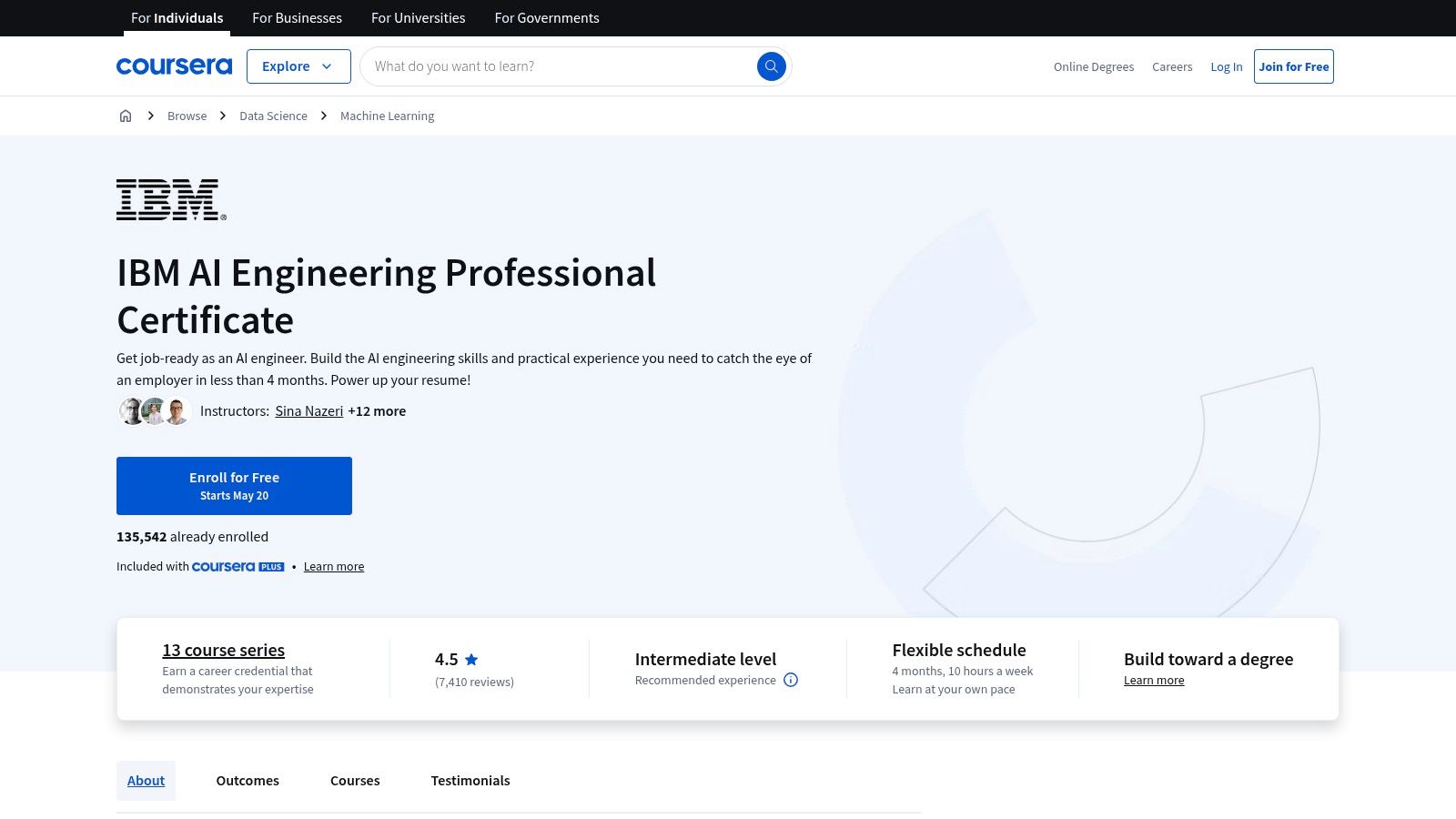
This six-course curriculum provides a structured learning path, taking you from the fundamentals to more advanced concepts. The flexible learning pace allows you to complete the program in approximately 3-6 months, fitting comfortably around your existing commitments. Upon completion, you'll receive an IBM Digital Badge, a valuable asset to showcase your newfound AI expertise. One of the best features is that no prior machine learning or AI knowledge is required! A solid grasp of Python programming is all you need to get started. Imagine building your own AI-powered tools to automate your go-to-market strategy or creating personalized vibe experiences for your audience – this certificate can help you achieve just that! You can Learn more about IBM AI Engineering Professional Certificate for further insights.
Features and Benefits:
- Comprehensive Curriculum: Covers both machine learning and deep learning, providing a solid foundation.
- Hands-on Projects: Gain practical experience using TensorFlow, PyTorch, and OpenCV through engaging projects.
- Flexible Learning Pace: Learn at your own speed, completing the program in 3-6 months.
- IBM Digital Badge: Receive official recognition from IBM upon completion.
- Beginner-Friendly: No prior AI or machine learning experience is necessary (Python knowledge required).
Pros:
- Developed by IBM: Learn from a leader in enterprise AI solutions.
- Affordable: Significantly more cost-effective than traditional university programs.
- Practical Applications: Focuses on real-world applications, making the skills immediately relevant.
- Ideal for Beginners: Provides a comprehensive introduction to AI engineering.
Cons:
- Less Recognition: May not carry the same weight as a university degree.
- Limited Advanced Research: Doesn't delve deeply into cutting-edge AI research topics.
- Course Quality Variance: Some students have reported inconsistencies in quality across the different courses.
The IBM AI Engineering Professional Certificate secures its place on our list of best AI certification courses due to its balanced blend of theoretical knowledge and practical application, its accessibility to beginners, and its affordability. If you're a non-technical AI enthusiast looking to develop practical AI skills, this certificate is an excellent starting point. You can enroll in the program and begin your AI journey here: https://www.coursera.org/professional-certificates/ai-engineer
2. Deep Learning Specialization by Andrew Ng
If you're serious about diving into the world of AI and seeking one of the best AI certification courses, the Deep Learning Specialization by Andrew Ng should be at the top of your list. Created by a true AI pioneer, this Coursera specialization comprises five courses designed to provide a comprehensive understanding of deep learning, from foundational concepts to building and leading machine learning projects. This program equips you with practical skills in neural networks, convolutional networks (CNNs), recurrent neural networks (RNNs), Long Short-Term Memory networks (LSTMs), and other cutting-edge techniques like Adam optimization, Dropout regularization, Batch Normalization, and Xavier/He initialization. Whether you're a non-technical AI enthusiast, a hobbyist vibe builder, or looking to leverage AI for go-to-market strategies and workflow automation, this specialization provides a robust foundation.
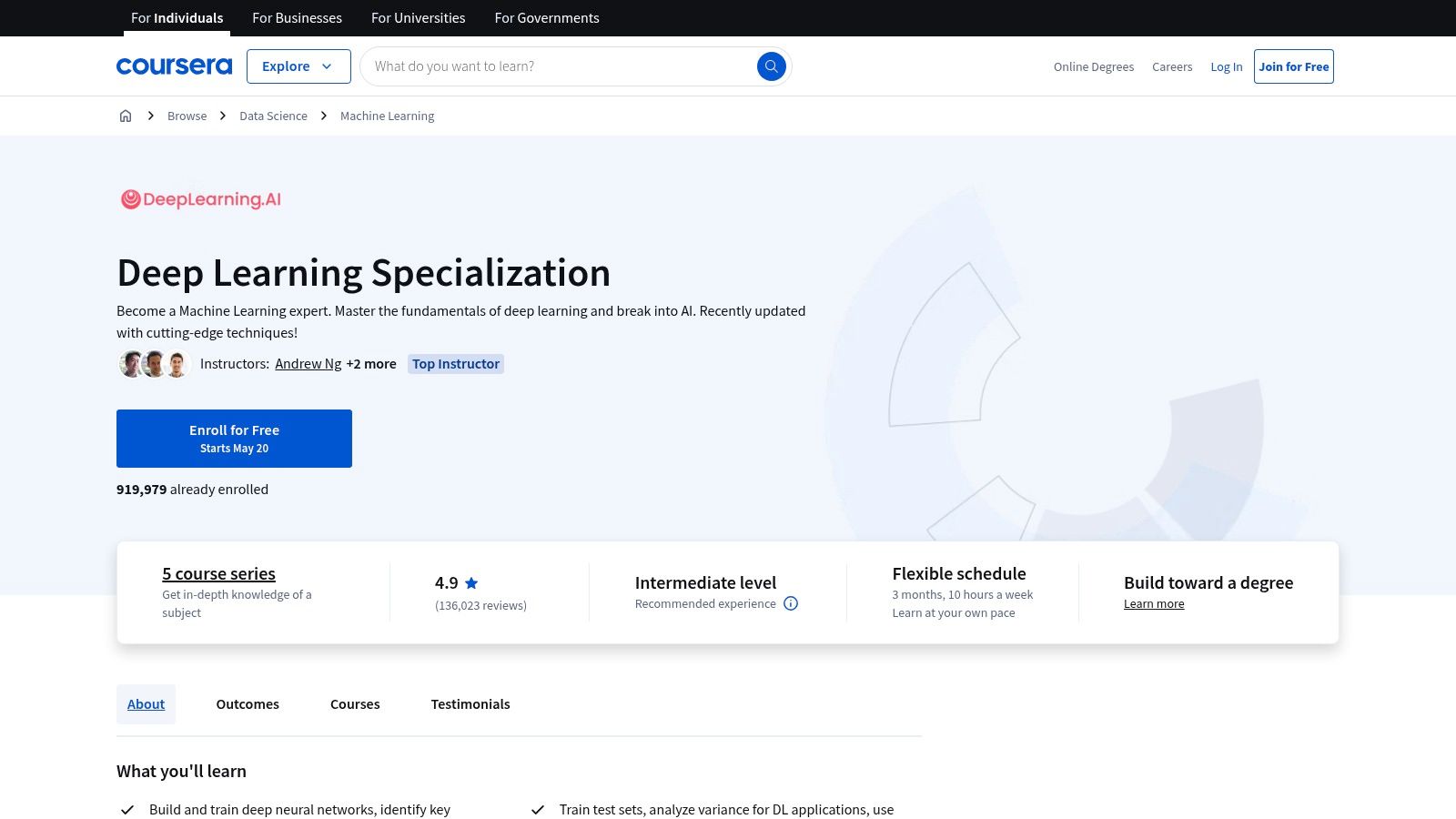
The Deep Learning Specialization stands out for its practical approach, focusing on real-world applications across diverse fields. You'll explore case studies in healthcare, autonomous driving, and natural language processing (NLP), providing valuable insights into how deep learning is transforming these industries. Imagine building your own image recognition system inspired by self-driving car technology, or crafting a sophisticated chatbot powered by NLP – this specialization empowers you to bring these ideas to life. This hands-on experience is particularly beneficial for those interested in using AI tools for tasks like prompting LLMs, exploring Replit use cases, automating workflows with n8n or Zapier, or even enhancing vibe marketing campaigns.
The specialization's strength lies in its accessibility and depth. Andrew Ng, co-founder of Google Brain, is renowned for his ability to explain complex mathematical concepts in an understandable way. The program uses Python, TensorFlow, and NumPy for coding assignments, giving you practical experience with industry-standard tools. While the program leans slightly more towards theory compared to some applied AI certifications, the strong focus on practical implementation through coding exercises bridges the gap.
While no specific pricing information is readily available, Coursera often offers various subscription models and financial aid options. Technical requirements generally involve a computer with internet access and the ability to run Python and related libraries. This specialization is a significant time commitment (approximately 3-4 months), which is important to consider. While challenging, the program is designed to be manageable even for relative beginners in programming. For a broader overview of different AI learning platforms and their potential in 2025 and beyond, learn more about Deep Learning Specialization by Andrew Ng.
This specialization earns its place among the best AI certification courses because it offers a comprehensive, accessible, and highly respected curriculum taught by a leading expert in the field. Its focus on practical application through coding exercises and real-world case studies makes it ideal for anyone wanting to gain a strong foundation in deep learning, regardless of their technical background. If you're ready to invest the time and effort, this specialization can open doors to a world of exciting opportunities in the ever-evolving landscape of AI. You can find the course on the official website: https://www.coursera.org/specializations/deep-learning.
3. Microsoft Azure AI Fundamentals (AI-900)
Looking to dip your toes into the exciting world of Artificial Intelligence but feeling a little overwhelmed? Microsoft Azure AI Fundamentals (AI-900) might be the perfect starting point for you. This certification is designed specifically for both technical and non-technical folks, meaning you don't need to be a coding whiz to understand the core concepts of AI. It focuses on foundational knowledge of machine learning and AI, along with how these concepts are applied within Microsoft's Azure cloud services. Imagine being able to confidently discuss AI workloads like natural language processing (think chatbots and sentiment analysis!), computer vision (analyzing images and videos), conversational AI (building interactive voice assistants), and even generative AI (creating new content like images and text) – all without needing a deep technical background. This certification helps you achieve just that.
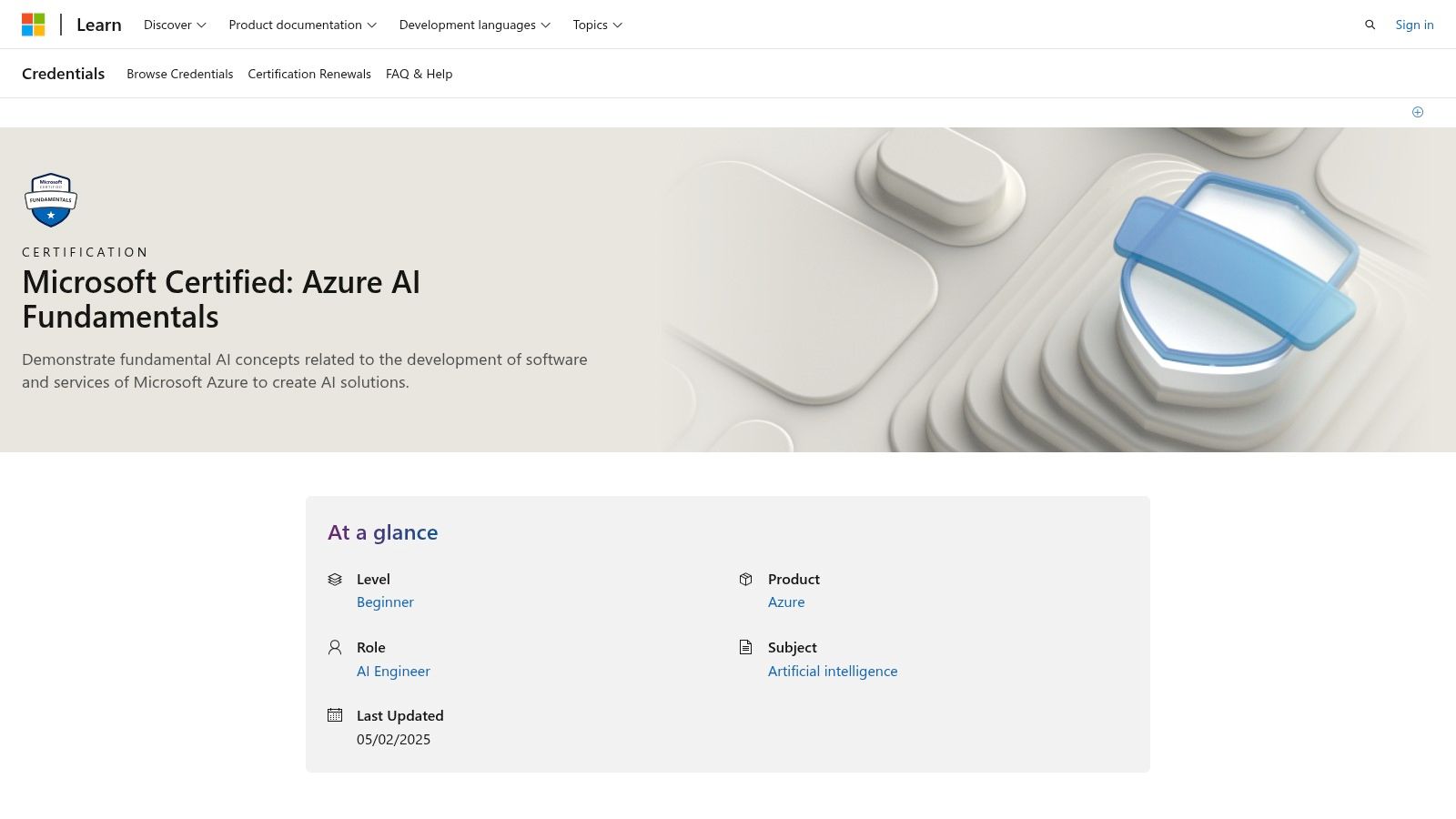
This certification deserves a spot on our "best ai certification courses" list because it offers a practical and accessible entry point to AI. For hobbyist vibe builders looking to integrate AI into their projects, this certification can help you understand the potential of different AI services. Are you dreaming of building a chatbot for your community? Learning about Azure Bot Service within the AI-900 curriculum can set you on the right path. Interested in automating parts of your go-to-market strategy with AI? The concepts covered in this certification, like natural language processing and generative AI, can give you the foundational knowledge to explore tools like Jasper.ai or Copy.ai more effectively.
The AI-900 exam covers Azure AI services like Azure Cognitive Services, which provides pre-built AI models you can easily integrate into your projects, and Azure Bot Service for building conversational interfaces. It even introduces you to the fascinating world of generative AI, empowering you to explore the latest advancements in AI content creation. The best part? You don't need to take mandatory courses before the exam, giving you the flexibility to learn at your own pace using the plentiful (and often free!) resources available online, including Microsoft's own learning paths. The exam itself is relatively affordable, costing around $99, making it a budget-friendly option for many.
Pros:
- Industry-recognized credential: Having a Microsoft certification on your resume adds significant value, especially as you explore AI-related roles.
- Affordable: At around $99, the exam fee is much less than many other certifications.
- Gateway to advanced certifications: AI-900 acts as a stepping stone to more specialized Microsoft AI certifications.
- Abundant resources: Free and paid learning paths are readily available, making preparation easier.
Cons:
- Microsoft-centric: The certification focuses primarily on the Microsoft Azure ecosystem, not general AI principles.
- Conceptual, not hands-on: While it introduces key concepts, it’s less hands-on than some other certifications.
- Annual renewal: You’ll need to renew the certification yearly to maintain its validity.
Implementation/Setup Tips:
- Explore the free learning paths available on the Microsoft Learn platform.
- Focus on understanding the practical applications of each AI workload discussed.
- Consider experimenting with free trials of Azure services to get a feel for how they work.
If you're eager to explore AI within the Microsoft ecosystem and gain a foundational understanding of various AI workloads, the Microsoft Azure AI Fundamentals (AI-900) certification is an excellent starting point. Check out the official page for more details: https://learn.microsoft.com/en-us/credentials/certifications/azure-ai-fundamentals/
4. Google Cloud Professional Machine Learning Engineer
If you're serious about building and deploying real-world AI solutions using cutting-edge cloud technology, and you're already familiar with the basics of machine learning, the Google Cloud Professional Machine Learning Engineer certification might be your perfect next step. This certification isn't just about theory; it dives deep into the practical application of machine learning principles using Google Cloud's powerful suite of tools. Think of it as leveling up your AI game and proving you can build production-ready AI systems. This makes it one of the best AI certification courses for those looking to advance their career.
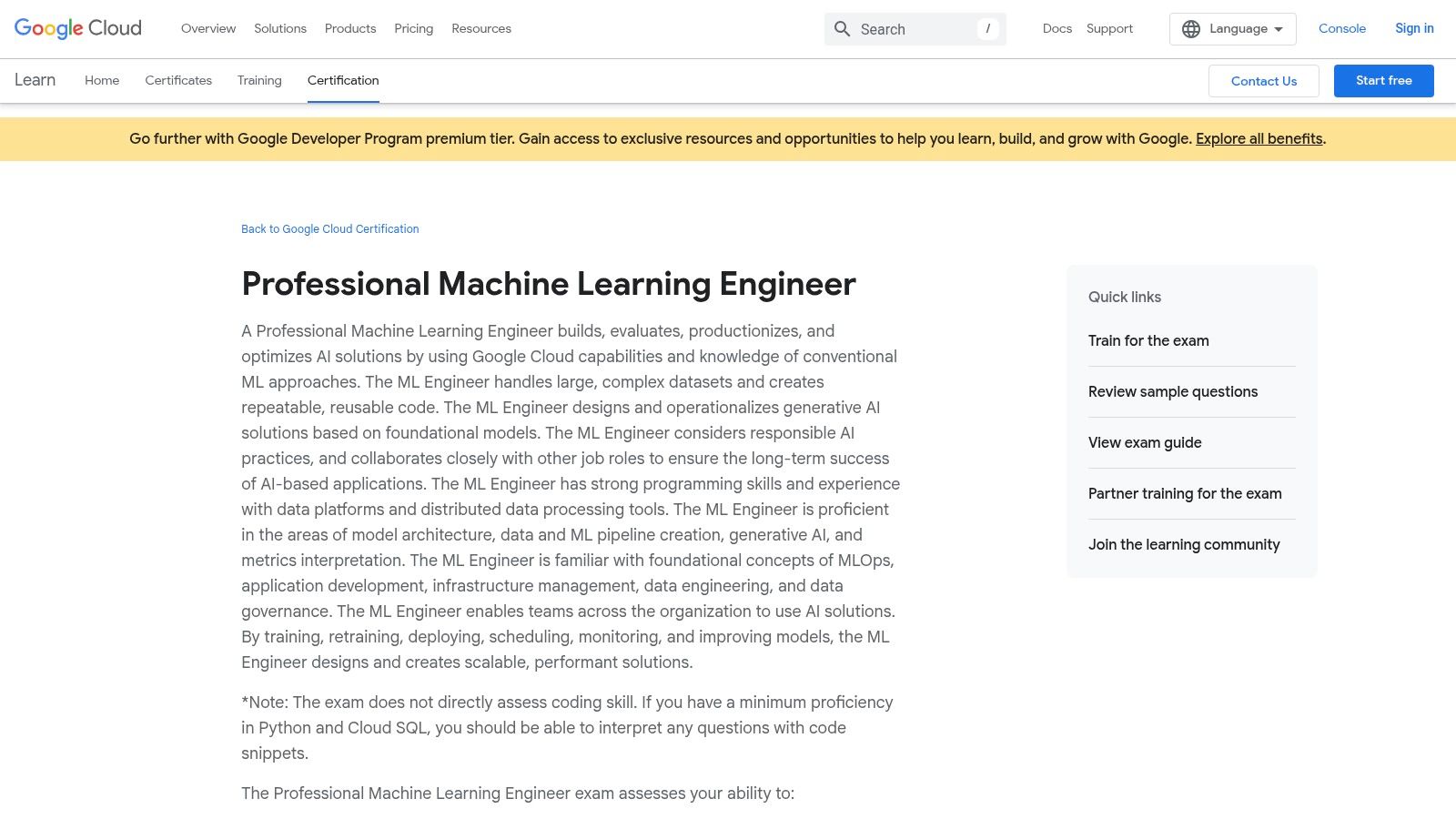
This certification focuses on equipping you with the skills to tackle real-world business challenges using AI. Imagine automating complex workflows, personalizing user experiences, or building predictive models for your go-to-market strategy – this certification empowers you to do all that and more. You'll delve into MLOps, the practice of streamlining the machine learning lifecycle, making your AI projects more efficient and scalable. You'll also become proficient with TensorFlow, a powerful open-source library for building and training machine learning models, and explore the vast array of Google Cloud AI services.
This certification is particularly relevant for those interested in leveraging AI for practical applications. For instance, if you're a vibe builder looking to personalize content recommendations or automate social media engagement, the skills gained here can be incredibly valuable. Similarly, if you're exploring AI for go-to-market strategies, understanding how to build and deploy predictive models on a scalable platform like Google Cloud is crucial. Even for hobbyists building AI-powered projects on Replit or automating workflows with tools like n8n and Zapier, the foundational knowledge and practical skills acquired through this certification can open up a world of possibilities.
Features:
- Industry-recognized Google certification specifically for ML professionals.
- Strong emphasis on building production-ready ML systems on Google Cloud.
- Comprehensive coverage of MLOps, TensorFlow, and Google Cloud AI services.
- Hands-on validation of skills through challenging exam scenarios.
Pros:
- Highly valuable credential for ML professionals working with cloud technologies.
- Validates both theoretical knowledge and practical implementation skills.
- Showcases expertise in a major cloud provider's ML ecosystem (Google Cloud).
- Can open doors to higher-paying job opportunities.
Cons:
- This is an advanced certification, not recommended for beginners.
- The exam fee is relatively expensive (approximately $200).
- Requires a deep understanding of Google Cloud Platform.
- Significant preparation, including hands-on experience, is necessary.
Technical Requirements/Prerequisites: Google recommends 3+ years of industry experience, including at least 1+ year working with Google Cloud.
Pricing: Approximately $200 for the exam.
Website: https://cloud.google.com/certification/machine-learning-engineer
While this certification requires a significant investment of time and effort, the payoff can be substantial. It's a powerful signal to employers that you possess the skills and knowledge to build and deploy impactful AI solutions using one of the leading cloud platforms. If you're ready to take your AI skills to the next level, the Google Cloud Professional Machine Learning Engineer certification is definitely worth considering.
5. AWS Certified Machine Learning - Specialty
For those looking to dive deep into the practical application of AI within a robust cloud environment, the AWS Certified Machine Learning - Specialty certification is a powerful asset. This certification isn't just about understanding AI theory; it's about building, deploying, and managing real-world machine learning solutions using the vast toolkit offered by Amazon Web Services (AWS). This focus on hands-on skills makes it a particularly valuable credential among the best AI certification courses, especially for those interested in leveraging AI for practical business applications, such as those used in vibe marketing and go-to-market strategies.
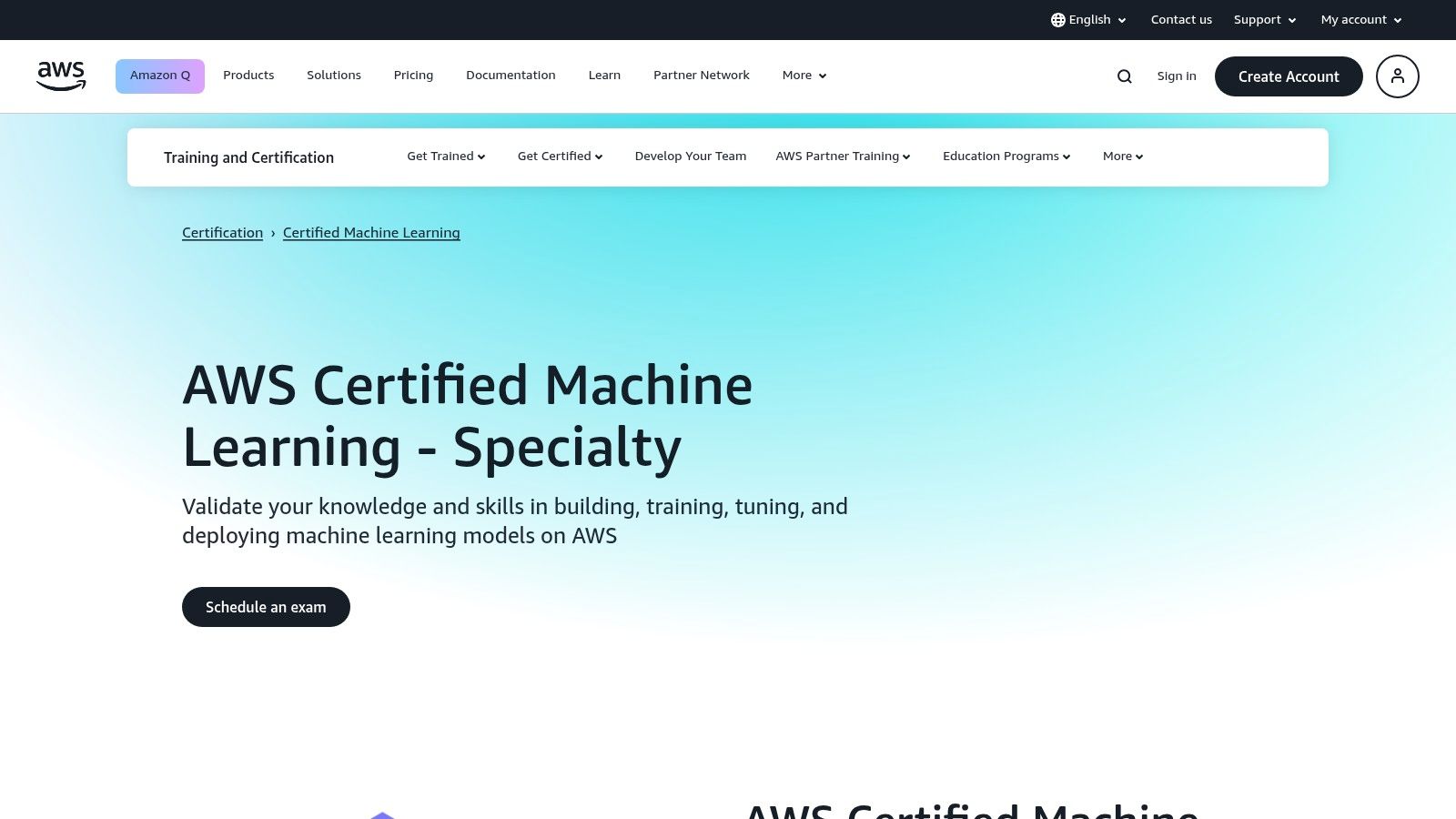
Imagine automating parts of your AI workflow, like training a model to analyze customer sentiment or predicting market trends. With the knowledge gained from this certification, you could leverage AWS services like SageMaker (a fully managed machine learning service) and EMR (a big data processing platform) to build and deploy these solutions efficiently. This certification validates your ability to handle everything from data engineering and exploratory data analysis to model building, implementation, and ongoing operations. This is directly relevant to automating various AI-driven tasks, similar to the strategies discussed in this article: Learn more about AWS Certified Machine Learning - Specialty. It’s particularly helpful if you're exploring AI workflow automations using tools like Replit, n8n, or Zapier, and are looking to integrate them with a powerful cloud platform.
This certification stands out due to its comprehensive coverage of machine learning on AWS. It's not simply a theoretical overview of AI; it dives into the specific services and tools provided by AWS, giving you practical experience in building and deploying machine learning models in a real-world cloud environment. While the certification itself doesn't specifically cover prompting LLMs (Large Language Models) in detail, the underlying AWS infrastructure and services you learn about are essential for deploying and managing these powerful AI models effectively.
Features & Benefits:
- Comprehensive Coverage: The certification covers a wide range of ML-related topics within the AWS ecosystem, from data preprocessing to model deployment and monitoring.
- Industry Recognition: AWS is a leading cloud provider, and this certification carries significant weight with employers seeking cloud-based ML expertise.
- Career Advancement: Earning this certification can open doors to new opportunities and potentially lead to higher salaries.
Pros:
- Highly sought after by employers using AWS.
- Combines theoretical knowledge with practical cloud implementation skills.
- Can boost your career prospects and earning potential.
- AWS offers numerous learning resources and practice exams.
Cons:
- The exam fee is relatively high ($300).
- Requires some prior experience with AWS services.
- Not ideal for complete beginners to machine learning.
- Focus is specifically on the AWS ecosystem, not general AI principles.
Technical Requirements: While the certification doesn't list specific technical requirements, practical experience with AWS services and a fundamental understanding of machine learning concepts are strongly recommended before attempting the exam. Having 1-2 years of experience in a development or data science role involving machine learning is suggested.
Pricing: The exam costs $300.
Website: https://aws.amazon.com/certification/certified-machine-learning-specialty/
In short, if you’re serious about applying AI within a cloud environment and are looking for a best ai certification courses option to enhance your career, the AWS Certified Machine Learning - Specialty is worth considering. It's a demanding but rewarding certification that can set you apart in the rapidly growing field of applied AI.
6. TensorFlow Developer Certificate
Looking to dive into the practical side of AI and build real-world applications? The TensorFlow Developer Certificate might be the perfect fit for your journey among the best AI certification courses. This certification, developed by Google, isn't just about theory; it's about proving you can actually build things with TensorFlow, one of the leading machine learning frameworks. This focus on practical application makes it particularly appealing to hobbyist vibe builders, those exploring AI use cases, and anyone looking to incorporate AI into their go-to-market strategy or workflow automations.
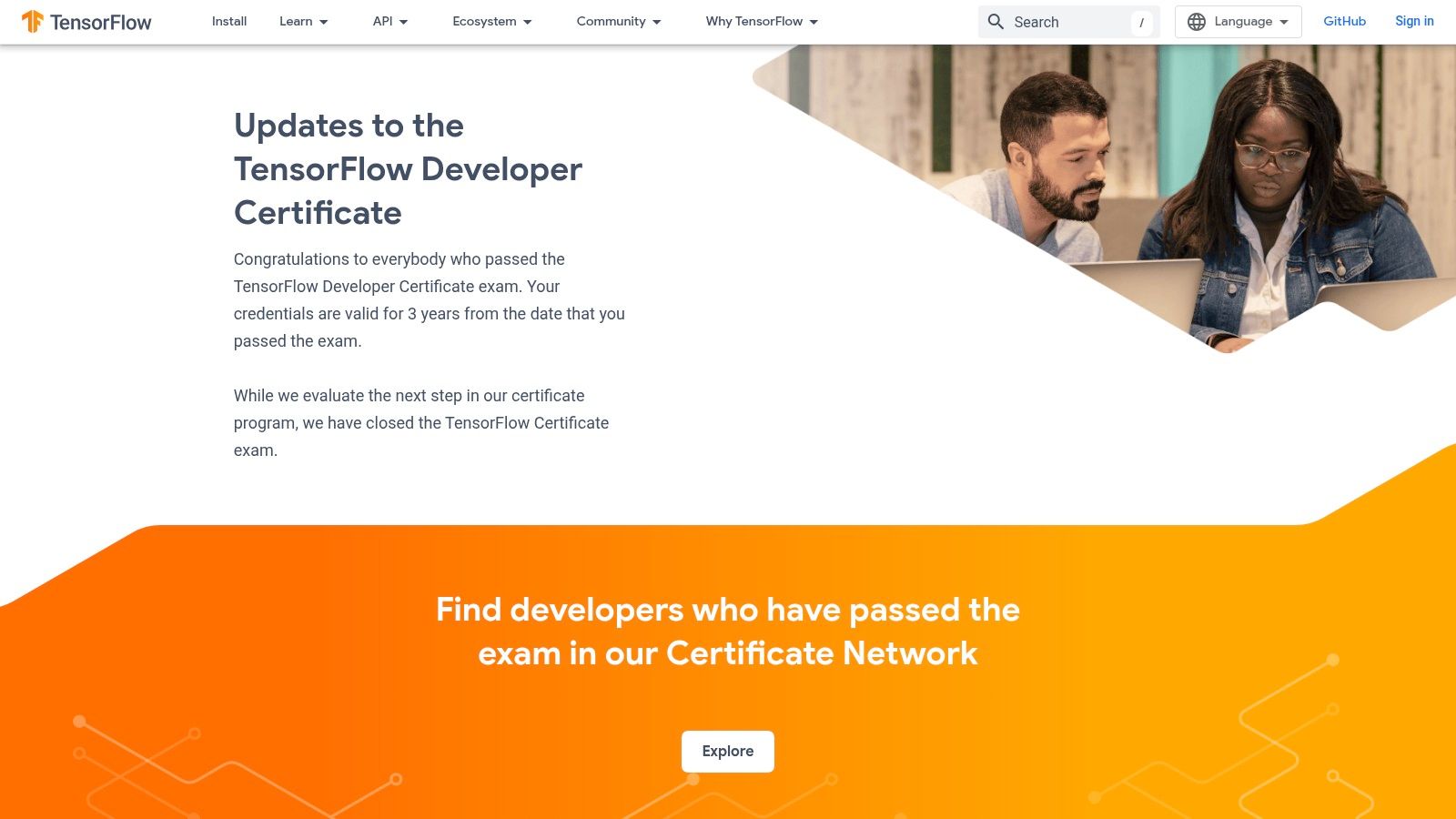
Imagine building your own image recognition system, a natural language processing tool, or even a time series forecasting model. This certification equips you with the skills to bring these projects to life. The five-hour exam tests your ability to code and implement solutions using TensorFlow, addressing real-world problems across these domains. Think of it as a portfolio-building exercise, demonstrating your practical coding skills to potential employers or clients. This hands-on approach is particularly valuable for showcasing your ability to prompt LLMs effectively, build innovative Replit use cases, and create powerful automations using tools like n8n and Zapier.
This certificate stands out among other best AI certification courses because it emphasizes practical implementation. While other certifications might focus on broader AI concepts or the theoretical underpinnings of machine learning, the TensorFlow Developer Certificate hones in on your ability to use TensorFlow effectively. This targeted approach can be a significant advantage for those looking to quickly acquire in-demand skills and start building immediately.
Features and Benefits:
- Official Google Certification: Adds credibility to your skills and demonstrates your TensorFlow proficiency to employers.
- Performance-Based Assessment: No multiple-choice quizzes here! You'll build real models to prove your expertise.
- Focus on Key AI Areas: Covers computer vision, NLP, and time series forecasting, equipping you with versatile skills.
- Industry Recognition: Highly valued by companies seeking practical deep learning expertise.
- Networking Opportunities: Inclusion in Google's Certificate Network connects you with other certified developers.
Pros:
- Validates practical coding abilities.
- Focuses on TensorFlow, a widely used ML framework.
- Relatively affordable ($100 exam fee).
- Recognized by employers.
Cons:
- Narrow focus on TensorFlow (less on broader AI theory).
- Emphasis on implementation, less on model design.
- Challenging 5-hour time limit for the exam.
- Requires solid Python and ML prerequisites.
Technical Requirements and Implementation Tips:
A strong foundation in Python and basic machine learning concepts is essential before tackling this certification. Familiarize yourself with TensorFlow’s core functionalities, explore various model architectures, and practice building applications across the domains covered in the exam. Google provides numerous resources and tutorials to help you prepare.
Website: https://www.tensorflow.org/certificate
This certification is a valuable asset for anyone looking to gain practical experience with TensorFlow and demonstrate their ability to build real-world AI applications. It’s a powerful tool for anyone looking to enhance their AI workflow automations, explore exciting new use cases, and ride the wave of innovation in the AI space.
7. AI For Everyone by Andrew Ng
Looking to break into the world of AI but feeling intimidated by the technical jargon? AI For Everyone by Andrew Ng is your perfect starting point. This course stands out among the best AI certification courses for its accessibility and business-focused approach. It's designed specifically for non-engineers, empowering business professionals, executives, product managers, and anyone curious about AI's impact to understand its potential without needing to code. This course demystifies AI, making it relatable and applicable to various industries and roles. You'll learn how AI can transform your go-to-market strategy, automate workflows (think Zapier, n8n, or even building your own with Replit!), and even how prompting LLMs can revolutionize your vibe marketing efforts.
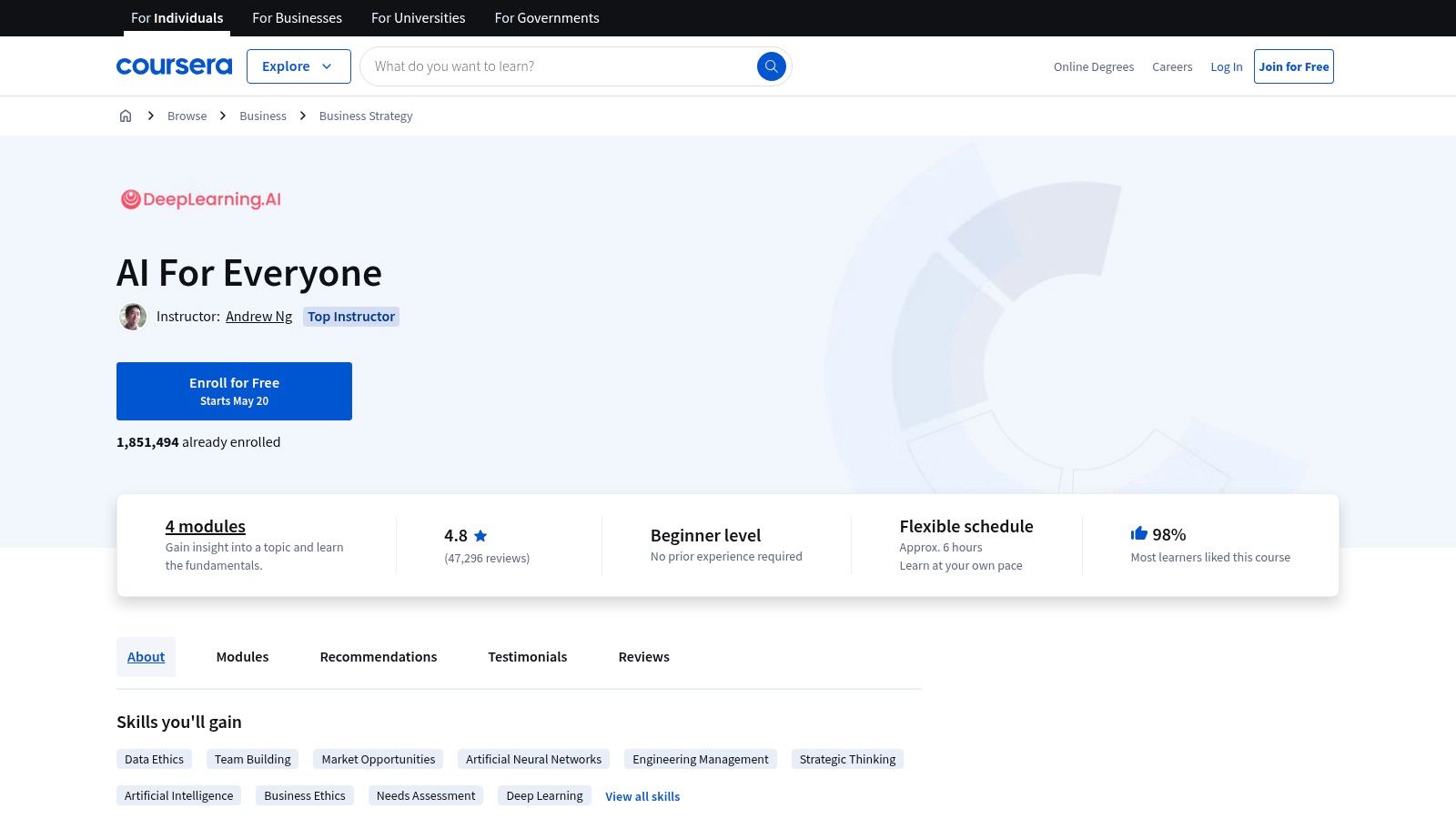
Taught by Andrew Ng, a co-founder of Coursera and a leading figure in the AI world, this course offers a concise and practical overview of AI terminology, capabilities, limitations, and implementation strategies. Instead of diving into complex algorithms, you'll explore real-world AI use cases and how they can be applied to solve business problems. Imagine understanding how AI can optimize your hobbyist projects, enhance your vibe-building endeavors, or even personalize your customer interactions. This course gives you the foundational knowledge to do just that.
Features include a non-technical curriculum accessible to all, a relatively short time commitment (around 4 weeks at 2-3 hours per week), and a certificate of completion from DeepLearning.AI on Coursera. The course is typically under $50 or even free with a Coursera subscription, making it an incredibly affordable option among other best AI certification courses. For those interested in exploring advanced prompting techniques after completing the course, check out this resource: Learn more about AI For Everyone by Andrew Ng. It provides a wealth of prompt engineering examples that can further boost your AI skills.
Pros:
- Perfect for beginners: An ideal introduction for business leaders and non-technical professionals seeking a foundational understanding of AI.
- Expert instruction: Learn from one of the most respected AI educators globally.
- Budget-friendly: Highly affordable, offering excellent value for the knowledge gained.
- Practical approach: Focuses on the business applications of AI rather than complex technical details.
Cons:
- Too basic for technical audiences: Not suitable for individuals with existing technical AI backgrounds.
- Not a technical credential: Doesn't qualify as a technical certification for AI practitioners.
- Limited job-seeking value: Less valuable for job seekers compared to more technical AI certifications.
- Minimal hands-on component: Primarily focused on theoretical understanding rather than practical application.
Despite its limitations for technical audiences, AI For Everyone earns its spot on this list of best AI certification courses due to its unparalleled ability to bridge the knowledge gap for non-technical professionals. If you're eager to understand the transformative power of AI and its implications for your business or personal projects, this course is the perfect place to start. You can enroll in the course here: https://www.coursera.org/learn/ai-for-everyone
8. Certified Artificial Intelligence Practitioner (CAIP) by CertNexus
Looking for a comprehensive and vendor-neutral way to boost your AI career? The Certified Artificial Intelligence Practitioner (CAIP) certification from CertNexus might be just the ticket. This certification validates the skills and knowledge needed to design, implement, and maintain AI solutions, regardless of the specific platform or technology. It focuses on practical application, covering everything from data preparation and model selection to training, tuning, and deployment within real-world business settings. This makes it ideal for those interested in understanding the full lifecycle of AI implementation. It's a solid option for anyone serious about breaking into the AI field and proving their competency to potential employers.
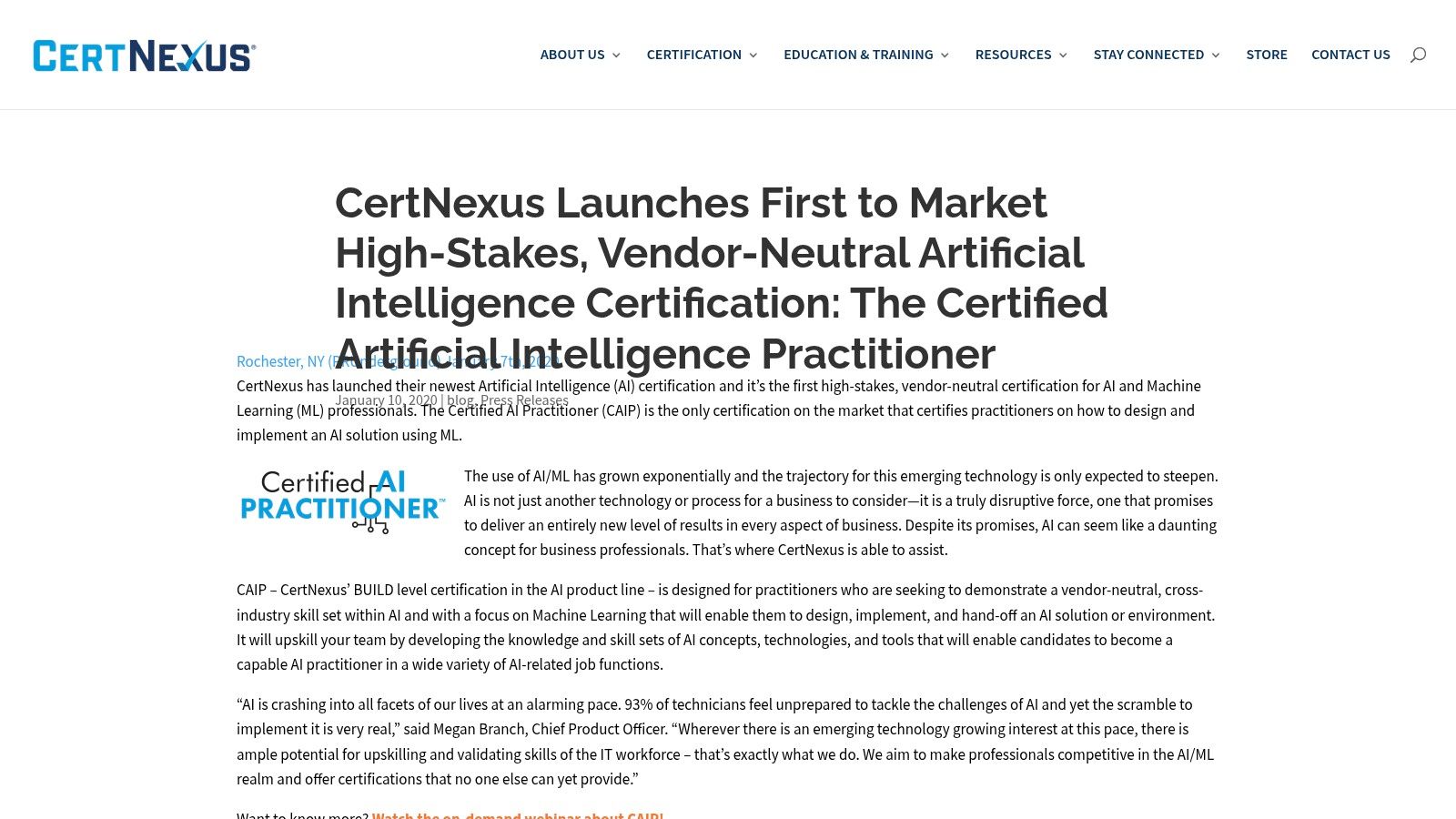
The CAIP distinguishes itself by being vendor-neutral, allowing you to apply your learned skills across various AI technologies. Whether you're interested in using Google's AI platform, Amazon's AWS AI services, or open-source tools, the principles learned through CAIP remain relevant. This broad applicability is a significant advantage in today's rapidly evolving AI landscape. This program provides a robust understanding of the AI implementation lifecycle, preparing you to tackle real-world projects. Imagine streamlining your go-to-market strategy with AI-powered insights, automating tedious workflows with tools like Zapier and n8n, or even crafting compelling marketing copy with the help of LLMs. CAIP equips you with the foundational knowledge to explore these possibilities and more. Learn more about Certified Artificial Intelligence Practitioner (CAIP) by CertNexus and how acquiring such certifications contributes to bridging the AI skills gap in today's rapidly evolving market.
This certification requires a solid foundation in AI and machine learning concepts, making it suitable for those who already have some experience in the field. The rigorous certification process, recognized by the ANSI/ISO 17024 accreditation, holds weight with employers and demonstrates a serious commitment to AI. It's designed with input from industry practitioners, ensuring the curriculum remains relevant and aligned with current best practices. Think of it as a powerful tool for those serious about building a successful AI career.
Pricing and Technical Requirements:
The CAIP exam typically costs between $250 and $300. While the exact technical prerequisites aren't publicly listed, a strong background in AI/ML fundamentals is strongly recommended.
Pros:
- Vendor-Neutral: Apply your knowledge across diverse technologies.
- Rigorous & Respected: Demonstrates a high level of competency.
- Comprehensive Coverage: Covers the entire AI implementation lifecycle.
- Industry-Relevant: Designed with input from practitioners.
Cons:
- Less Name Recognition: Compared to certifications from big tech companies.
- Relatively Expensive: The exam fee can be a barrier for some.
- Limited Prep Resources: Fewer readily available study materials.
- Requires Prerequisites: Not suitable for complete beginners in AI/ML.
Why CAIP Deserves Its Place on this List:
The CAIP certification offers a valuable, vendor-neutral approach to AI education. While it might not have the immediate name recognition of some big tech certifications, its rigorous curriculum, focus on practical application, and ANSI/ISO accreditation make it a powerful asset for anyone serious about pursuing a career in AI. This makes it especially valuable for those seeking to build a flexible and adaptable skillset applicable across different platforms and tools. For those invested in leveraging AI for activities such as vibe marketing, prompting LLMs for content creation, or exploring various Replit use cases, the CAIP’s comprehensive approach provides a strong theoretical base that can be practically applied in these diverse areas. It's a worthwhile investment for those looking to demonstrate a genuine commitment to the field and gain a comprehensive understanding of AI implementation. You can find more details on their official website: https://certnexus.com/certification/caip/
9. NVIDIA Deep Learning Institute (DLI) Professional Certificate
If you're serious about diving into the practical side of AI and harnessing the power of GPUs, the NVIDIA Deep Learning Institute (DLI) offers professional certificates that are among the best AI certification courses available. These certificates focus on giving you hands-on experience with the tools and techniques used in real-world AI development, making them ideal for anyone looking to build tangible AI skills. This isn't just about theory; you'll be tackling real problems using NVIDIA's GPU-accelerated platforms.
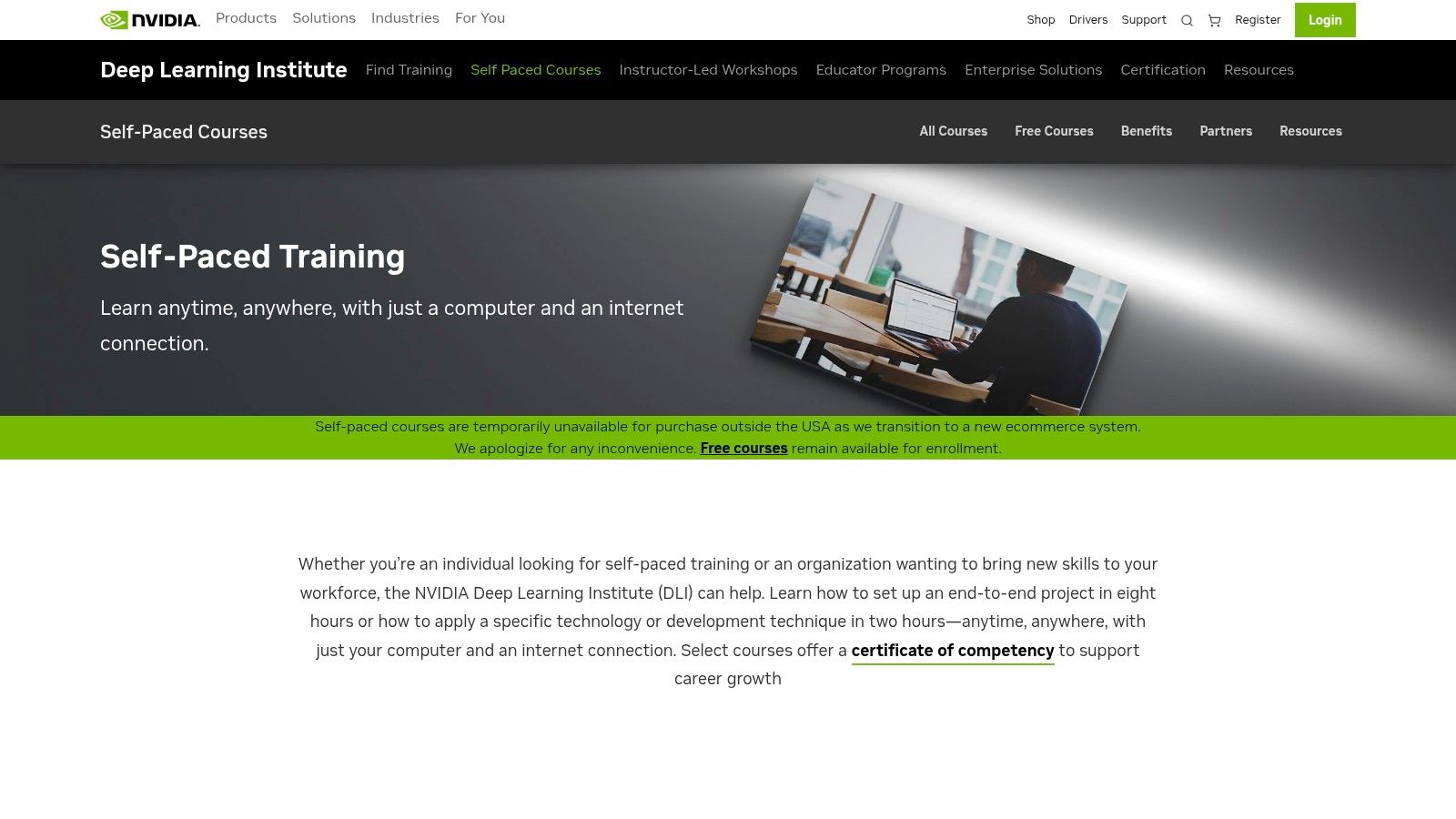
The DLI offers specialized tracks in key AI areas like Deep Learning, Computer Vision, Natural Language Processing (NLP), and Accelerated Computing. Imagine building an AI that can understand images or process human language—these certifications equip you with the skills to make that happen. For those interested in go-to-market strategies with AI, the practical skills learned here can be invaluable for developing and demonstrating cutting-edge AI features.
The focus on hands-on learning is a significant advantage. Instead of just clicking through multiple-choice quizzes, you’ll be completing project-based assessments. This approach not only solidifies your understanding but also provides you with portfolio-worthy projects to showcase your abilities. This practical experience translates directly into building AI-powered workflows and automations, whether you're using platforms like Replit, n8n, or Zapier, or even crafting clever prompts for Large Language Models (LLMs).
While some online AI courses might offer a broader overview, the DLI goes deep into the technical implementation, utilizing tools like CUDA, TensorFlow, and PyTorch. This is especially beneficial for those who want to optimize their AI workflows for GPU-accelerated performance, a crucial aspect for many modern AI applications.
Pros:
- Hands-on Focus: Develop real-world skills applicable to building and deploying AI solutions.
- NVIDIA Ecosystem: Learn from the leading hardware and software provider in AI acceleration.
- Specialized Tracks: Tailor your learning to your specific interests, whether it's computer vision, NLP, or another area.
- Project-based Assessments: Build a portfolio showcasing your practical AI capabilities.
Cons:
- NVIDIA-centric: The curriculum heavily emphasizes NVIDIA’s tools and ecosystem, which might not be ideal for everyone.
- Cost: DLI certificates can be more expensive than some online alternatives.
- Technical Prerequisites: Requires a solid foundation in programming before starting.
Pricing: Varies depending on the specific course and certificate. Check the NVIDIA DLI website for current pricing.
Technical Requirements: Access to a computer with internet access and, for some courses, access to a GPU-enabled environment.
Website: https://www.nvidia.com/en-us/training/online/
The NVIDIA DLI Professional Certificate earns its spot on this list of best AI certification courses because it offers a unique blend of deep technical expertise and practical application, making it ideal for aspiring AI practitioners who want to build tangible skills and get their hands dirty with the leading tools in the field. It's a significant investment, but the return in terms of practical skills and career advancement potential can be substantial.
Top 9 AI Certification Courses Comparison
| Certification / Course | Core Features / Focus | User Experience & Quality ★ | Value & Price 💰 | Target Audience 👥 | Unique Selling Points ✨ |
|---|---|---|---|---|---|
| IBM AI Engineering Professional Certificate | 6-course AI engineering, TensorFlow, PyTorch, OpenCV | Practical projects, beginner-friendly ★★★★☆ | Affordable, flexible pacing 💰 | Beginners to intermediate AI learners | IBM-backed, hands-on projects |
| Deep Learning Specialization by Andrew Ng | Deep learning fundamentals, CNNs, RNNs, transformers | In-depth, taught by AI pioneer ★★★★★ | Mid-range, time-intensive 💰 | Intermediate to advanced learners | Andrew Ng’s teaching, strong industry reputation |
| Microsoft Azure AI Fundamentals (AI-900) | Azure AI services, conversational AI, generative AI | Exam-based, conceptual ★★★☆☆ | Low-cost exam (~$99) 💰 | Beginners, tech & non-tech professionals | Official Microsoft cert, broad AI intro |
| Google Cloud Professional ML Engineer | Production ML on Google Cloud, MLOps, TensorFlow | Challenging, hands-on exam ★★★★☆ | Expensive exam (~$200) 💰 | Experienced ML practitioners | Google Cloud specialization, high industry value |
| AWS Certified Machine Learning - Specialty | ML on AWS, SageMaker, data analysis | Practical, industry-recognized ★★★★☆ | High cost exam (~$300) 💰 | Experienced ML professionals | AWS ecosystem focus, broad ML deployment skills |
| TensorFlow Developer Certificate | TensorFlow coding skills, hands-on exam | Performance-based, practical ★★★★☆ | Affordable exam (~$100) 💰 | Developers focused on TensorFlow | Google certification, coding exam focus |
| AI For Everyone by Andrew Ng | Non-technical AI concepts, business focus | Accessible, short duration ★★★☆☆ | Low cost / free with subscription 💰 | Non-technical professionals | Business-oriented, no coding required |
| Certified AI Practitioner (CAIP) by CertNexus | Vendor-neutral AI lifecycle, ANSI/ISO accredited | Rigorous, broad AI topics ★★★★☆ | Expensive exam ($250-$300) 💰 | Experienced AI professionals | Vendor-neutral, ANSI/ISO accredited |
| NVIDIA Deep Learning Institute Professional Cert | GPU-accelerated AI, computer vision, NLP, CUDA | Hands-on, project assessments ★★★★☆ | Relatively expensive | Technical AI practitioners | NVIDIA GPU focus, specialized AI skill tracks |
Become an AI Trailblazer!
So, you're ready to dive into the exciting world of AI? Fantastic! This list of the 9 best AI certification courses offers something for everyone, from seasoned professionals looking to specialize to curious hobbyists eager to explore AI use cases. Key takeaways include recognizing the importance of aligning a certification with your career goals—whether you're focused on AI workflow automations, prompting LLMs, or exploring Replit, n8n, or Zapier use cases—and understanding the varying levels of technical expertise required for each program. Choosing the right certification is a crucial first step, setting you on a path toward mastering the skills you need. Remember to consider your current experience, desired learning outcomes, and the specific tools or platforms (like TensorFlow, Azure, or AWS) you're most interested in working with.
If you're interested in integrating AI into personal growth, consider exploring the intersection of technology and mindfulness with AI tools for self-hypnosis. This emerging field offers intriguing possibilities for enhancing well-being through AI-driven techniques.
Your AI journey is just beginning! Embrace the learning process, stay curious, and connect with fellow enthusiasts. Ready to level up your AI game and join a supportive community? Explore VibeMakers, a platform designed to connect you with resources, networking opportunities, and like-minded individuals passionate about AI and its potential. Join us and start building the future of AI, together!